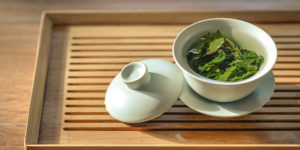By: Lauren
They say the world is divided into many diverse groups. Some of us prefer dogs to cats, snow to sun, meat to veggies, and coffee to tea. To be perfectly honest, I fell into the coffee drinker group until just recently. As I began to spend more of my time at The Tea Smith, I found myself preferring the taste of Cinnamon Sensation Rooibos and Matcha tea to my old standby- the triple tall Carmel Macchiato.
So is one drink really better than the other? And do you really have to choose one over the other?
Let’s start with coffee. If you’re like over half the adult population in the United States, you drink coffee everyday. Many coffee drinkers enjoy the taste. And for those who don’t, there are numerous variations – like sugar, milk, and syrups to disguise the flavor. Another reason people drink coffee is for a caffeine boost. Many people, myself included, swear by that first cup of coffee each morning.
Most regular coffee drinkers might argue their habit isn’t doing any harm to their bodies. In fact, they’ll point to reports touting the potential health benefits associated with coffee including: protecting against type 2 diabetes, Parkinson’s disease, liver disease, liver cancer, and promoting a healthy heart.
Please note- I am not suggesting that people start drinking coffee by the gallon. Too much of anything can be bad. The findings were based on black coffee. The same might not hold true for many of what I call dessert-based coffees that people consume.
I once read a quote from a nutritionist based at a London University who said “Drinking tea is actually better for you than drinking water. Her premise is that water is essentially replacing fluid. Tea replaces fluids and contains antioxidants so it’s got two things going for it.
Tea is the second most widely consumed beverage in the world, after water. Why? Because of its versatility: it can be drank cold or hot, and there are enough varieties of tea to suit just about any taste. (I’m going to guess that number is well over 2,000).
People also have been drinking tea for centuries because of its health effects. Research suggests drinking tea”particularly green tea”can fight diseases and even lengthen life. This is due to tea’s high concentration of antioxidants called polyphenols, which may contribute to the prevention of cancer, osteoporosis, and cardiovascular diseases. While polyphenols are also found in abundance in fruits, vegetables, and grains”and also coffee in even higher amounts”tea is especially and uniquely rich in particular types of polyphenols called catechins (specifically, EGCG) that may be the most powerful ones of all.
Purists consider only green tea, black tea, white tea, oolong tea, and pu-erh tea the real thing. They are all derived from the Camellia sinensis plant, a shrub native to China and India, and contain unique antioxidants called flavonoids. The herbal ‘teas’ or infusions, made from herbs, fruit, seeds or roots have lower concentrations of antioxidants. Their chemical make up varies depending on the plant used. Popular choices include—ginger, ginkgo biloba, ginseng, hibiscus, jasmine, rosehip, mint, rooibos (red tea), chamomile, and echinacea.
Although many questions remain about how long tea needs to be steeped for the most benefit, and how much you should drink, nutritionists agree any tea is good tea. They do prefer brewed teas over bottled to avoid the extra calories and sweeteners.
Both coffee and tea contain virtually no calories when mixed with water. Many drinkers add sugar and/or cream for a sweeter flavor. The actual tea leaf or coffee bean is virtually calorie-less. With no fat, no sodium, and no carbs “ where can you go wrong?
Both coffee and tea contain caffeine. Coffee has about twice as much as tea if you compare it cup to cup. Caffeine in reasonable amounts during the day is considered healthy for most people, as it helps accelerate the metabolism. Coffee has some B vitamins, potassium and other minerals while Tea is high in manganese, folate and potassium. Both add a bit of nutrient goodness to your daily mix.
The end conclusion is that you can derive benefits from drinking both coffee and tea.
So there you have it! And my next drink? A pumpkin spice latte from The Tea Smith!


